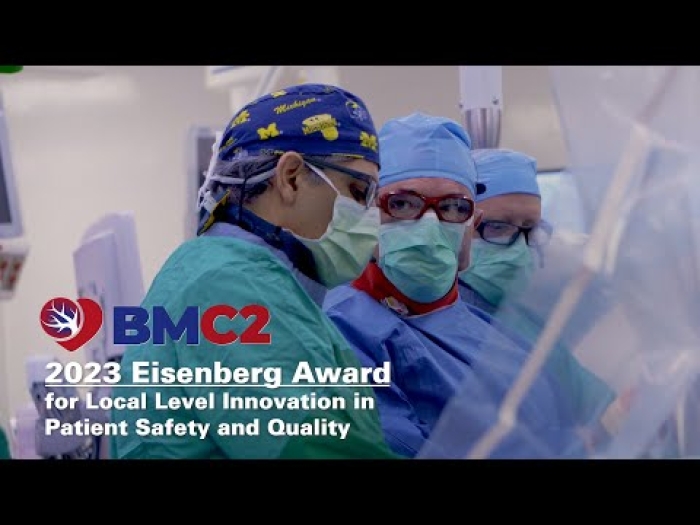Millions of patients have mitral valve surgery each year. How one Michigan Medicine patient decided which option was best for her.
7:00 AM
Author |

The onset of mitral valve disease didn't keep Perry Katsikas from living an active life. Relatively free of symptoms, she continued to exercise daily.
MORE FROM MICHIGAN: Sign up for our weekly newsletter
But Katsikas, like many of the millions of Americans diagnosed with a degenerative version of the disease, faced a decision: Should she have her mitral valve repaired or wait until her condition required complete valve replacement?
The body's mitral valve controls the flow of blood in one direction from the lungs to the body. If the valve doesn't close properly or open completely, the heart may have to work twice as hard to do its job — which can lead to atrial fibrillation, embolism, blood clots, stroke and congestive heart failure.
Under the care and counsel of Francis Pagani, M.D., a cardiac surgeon at the University of Michigan Frankel Cardiovascular Center, Katsikas chose repair.
Today, the Ann Arbor, Michigan, resident praises the decision: "Early intervention saved the quality of my life."
Weighing mitral valve repair vs. replacement
The Frankel Cardiovascular Center is home to one of the largest mitral valve practices in the country. Heart surgeon Steven Bolling, M.D., conducts hundreds of mitral valve repairs there each year.
Bolling says repair is "always better than replacement."
SEE ALSO: Does an Enlarged Aorta Always Mean Surgery?
The reason? "The heart's power is derived from the mitral valve," he says. So if a patient waits for symptoms to warrant replacement, it means the heart has already been compromised.
Valve repair, Bolling tells his patients, "will put you back on your natural life survival rate," as if a heart issue had never occurred.
A typical patient with mitral valve disease has been under a doctor's care for a long time, Pagani says. Indications of the need for mitral valve repair include a murmur that has gotten louder or regurgitation (backward blood flow) that has worsened.
Advantages of mitral valve repair
Katsikas' recovery was typical of many patients. She spent five days in the hospital after surgery in 2010, with light activity restrictions for three or four weeks afterward.
It helps for patients to be in good health when having mitral valve repair, Pagani and Bolling note. That can ensure the following benefits:
-
Reduced risk of complications after surgery
-
Quicker recovery
-
Better preservation of heart function
-
Reduced risk of stroke
-
Reduced risk of atrial fibrillation
Now 69 years old and still active, Katsikas can't imagine making a different decision — or going anywhere else for treatment.
"I came in feeling healthy, had surgery and went home feeling healthier," she says. "I felt Dr. Pagani cared about me and my outcome. And the outcome speaks for itself."
Learn more about treatment options for mitral valve disease offered at U-M's Frankel Cardiovascular Center. To make an appointment or discuss a need for treatment, call 888-287-1082.

Explore a variety of healthcare news & stories by visiting the Health Lab home page for more articles.

Department of Communication at Michigan Medicine
Want top health & research news weekly? Sign up for Health Lab’s newsletters today!





